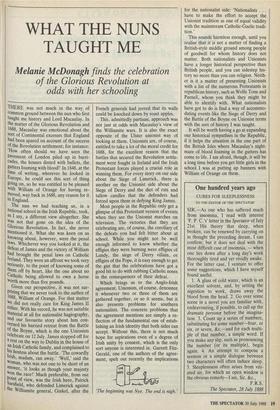WHAT THE NUNS TAUGHT ME
Melanie McDonagh finds the celebration
of the Glorious Revolution at odds with her schooling
THERE was not much in the way of Common ground between the nun who first taught me history and Lord Macaulay. In the matter of the Glorious Revolution and 1688, Macaulay was emotional about the sort of Continental excesses that England had been spared on account of the success of the Revolution settlement; for instance: How often should we have seen the pavement of London piled up in barri- cades, the houses dinted with bullets, the gutters foaming with blood!' In 1848, at the time of writing, wherever he looked in Europe, he could see this sort of thing going on, so he was entitled to be pleased with William of Orange for having re- moved, way back in 1688, any reason for it In England.
The nun we had teaching us, in a national school in the Irish Republic, took, as I say, a different view altogether. She was not that gone on the idea of the Glorious Revolution. In fact, she never mentioned it What she was keen on us knowing about, however, were the penal laws. Whichever way you looked at it, the defeat of James and the victory of William had brought the penal laws on Catholic Ireland. They were an affront we took very seriously, to the point of knowing some of them off by heart, like the one about no Catholic being allowed to own a horse worth more than five pounds.
Given our perspective, it was not sur- Prising that we never took to the author of 1688, William of Orange. For that matter We did not really care for King James II either. With his record, he was not suitable material at all for nationalist hagiography, and our favourite story about him con- cerned his hurried retreat from the Battle of the Boyne, which is the one Unionists celebrate on 12 July. James stopped off for a rest on the way to Dublin in the house of an Irish Catholic family, and complained to his hostess about the battle. 'The cowardly
madam, ran away.' Well,' said the woman, who was not one to be short of an answer, 'it looks as though your majesty won the race!' Much preferable, from our Point of view, was the Irish hero, Patrick Sarsfield, who defended Limerick against the Williamite general, Ginkel, after the French generals had jeered that its walls could be knocked down by roast apples.
This, admittedly partisan, approach was not just at odds with Macaulay's view of the Williamite wars. It is also the exact opposite of the Ulster unionist way of looking at them. Unionists are, of course, entitled to take a lot of the moral credit for 1688, for the excellent reason that the battles that secured the Revolution settle- ment were fought in Ireland and the Irish Protestant forces played a crucial role in winning them. For every story on our side about the Siege of Limerick, there is another on the Unionist side about the Siege of Derry and the diet of rats and tallow candles that the defenders had forced upon them in defying King James.
Most people in the Republic only get a glimpse of this Protestant version of events when they see the Unionist marches on television. The victories that they are celebrating are, of course, the corollary of the defeats you had felt bitter about at school. While you might not be well enough informed to know whether the effigies they were burning were effigies of Lundy, the siege of Derry villain, or effigies of the Pope, it is easy enough to get the gist that the celebrations have got a good bit to do with rubbing Catholic noses in the consequences of their defeat.
Which brings us to the Anglo-Irish agreement. Unionists, of course, denounce it whenever two or three of them are gathered together, or so it seems, but it also presents problems for southern nationalists. The concrete problems that the agreement mentions are simply a re- flection of the fundamental one of estab- lishing an Irish identity that both sides can accept. Without this, there is not much hope for aspirations even of a degree of Irish unity by consent, which is the only sort anyone is interested in. Garrett Fitz- Gerald, one of the authors of the agree- ment, spelt out recently the implications `The beginning was Nye. The end is nigh.' for the nationalist side: 'Nationalists . . . have to make the effort to accept the Unionist tradition as one of equal validity with the mainstream Catholic-Gaelic tradi- tion.'
This sounds harmless enough, until you realise that it is not a matter of finding a British-style middle ground among people of goodwill for whom history does not matter. Both nationalists and Unionists have a longer historical perspective than British people, and you can sidestep his- tory no more than you can religion. Neith- er is it a matter of presenting Unionists with a list of the numerous Protestants in republican history, such as Wolfe Tone and Parnell, whom you think they might be able to identify with. What nationalists have got to do is find a way of accommo- dating events like the Siege of Deny and the Battle of the Boyne on Unionist terms with the sort of history I was taught.
It will be worth having a go at expanding our historical sympathies in the Republic, if it helps the situation in the one part of the British Isles where Macaulay's night- mare of blood foaming in the gutters has come to life. I am afraid, though, it will be a long time before you get little girls in the school I was at putting up banners with William of Orange on them.














































 Previous page
Previous page